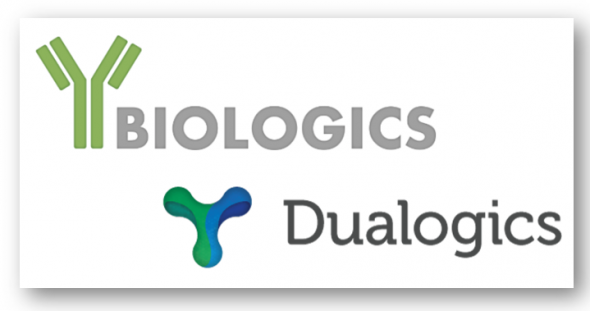Y-Biologics Pursues Joint Development of Bispecific Antibody with Dualogics
DATE : 2019.06.11Author : Y-Biologics
VIEWS : 960
Discovery of an antibody from Y-Biologics’ human antibody library and provision of a bispecific antibody platform by Dualogics for a discovery of new immuno-oncology drug
Y-Biologics, specializing in the development of human antibodies, has partnered up with an American biotech company to broaden the applications of its bispecific antibody platform. The company announced that it had signed an agreement with Dualogics, a company specializing in bispecific antibodies that is headquartered in Durham, North Carolina, to jointly develop a new immuno-oncology drug.
Y-Biologics plans to develop a number of new bispecific antibodies for immunotherapy using the antibodies discovered based on its own human antibody library, Y-max ABL, and OrthoMab, the bispecific antibody platform technology of Dualogics. The two companies plan to jointly discover lead candidates for drug development. However, financial terms and conditions were not disclosed.
Y-Biologics CEO Young Woo Park said, “It brings us great pleasure to prove the excellence of Y-max ABL, a unique human antibody library enabling rapid discovery of various antibodies, through this agreement. [...] We will open a new chapter in the development of bispecific antibodies for immunotherapy through our collaboration with Dualogics with its bispecific antibody platform technology, OrthoMab.”
Ryan Hallett, CEO of Dualogics, said, “I am very pleased to be collaborating with Y-Biologics, a company that has established expertise in the field of antibodies and is capable of quickly discovering diverse new antibodies using its own library. [...] Based on our expertise on bispecific antibodies and Y-Biologics’ ability to discover antibodies, this collaboration will be a major opportunity to provide new therapeutics to patients suffering from cancer.”
Y-Biologics has its own bispecific T cell engager antibody platform, Antibody-Like Cell Engager (ALiCE). The platform consists of Fab, targeting two (bivalent) cancer antigens, and CD3 Fv, targeting one (monovalent) cancer antigen. A binding group for antibody purification is unnecessary in the production process, so it can be rapidly manufactured without any antibody modification, and the production cost is low as well. The ALiCE platform, however, does not have an effector function, which is necessary according to the specific anticancer target, which was the reason this agreement was signed.
Dualogics’ bispecific antibody technology, OrthoMab, was licensed after it was developed by Professor Brian Kuhlman at the University of North Carolina, and Dualogics was established in 2015. OrthoMab allows binding of different types of antibodies by creating mutations in two regions (Fab and Fc domains) of a monoclonal antibody scaffold. It is said that various types of bispecific antibody platforms can be created based on this technology. Dualogics is conducting a preclinical R&D project with new drug candidates for autoimmune diseases and cancer using OrthoMab.

